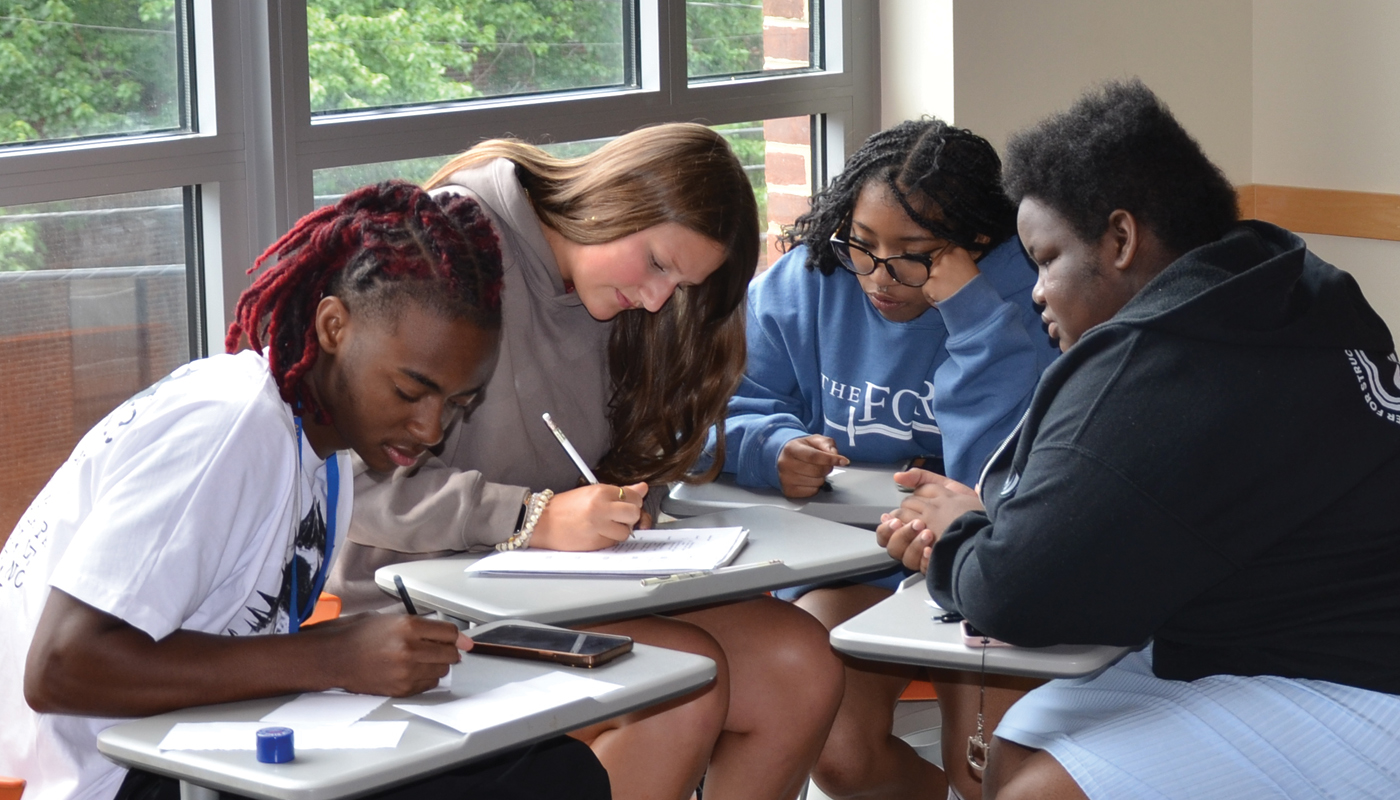This summer, most of the 26 Delaware-area High School students arrived at the Siegfried Youth Leadership Program (SYLP) Economics Camp, hosted at the University of Delaware, believing economics was all about money and government.
“Before this week I thought economics had something to do with money, government, networking and investing,” said Clay Mosey, a student from Hodgson Vo-Tech in Newark.
Hosted by the UD’s Center for Economic Education and Entrepreneurship (CEEE), the weeklong camp provided students ages 15-17 practical activities helping them discover that economics is about making choices in the face of scarcity and understanding the reasons behind those choices. The following are four takeaways from the week.
- Think in Tradeoffs: Every Decision Carries a Cost
“Something that will stick with me is the idea of seeing the unseen, the opportunity you missed out on or the cost you incurred because of the decision you made,” said Lauren Mensah, a student attending Howard High School in Wilmington.
That insight captures the essence of opportunity cost.
As presenter Roger Butters, associate professor of economics at Hillsdale College, explained, every “yes” means saying “no” to something else. When asked what campers would have done if not attending the SYLP Economics Camp, students mentioned jobs, other camps, or sports.
Their choice to attend the SYLP camp became their first lesson: the tradeoff must have been worth the sacrifice.
To make this practical, ask:
- What am I giving up when I make this choice?
- Out of the things I give up, which is my next-best alternative ?
That awareness helps make better informed decisions because tradeoffs are thought through with the choices made.
- Follow the Incentives
In a simulation led by UD alum Josh Dalton, who earned his Ph.D. in economic education in 2023 and now is a professor at the University of Tennessee in Knoxville, students acted as firms in an oligopoly (in which a market is shared by a small number of producers or sellers). They attempted to collude on production and pricing (an illegal activity under U.S. antitrust law) to maximize profits. When one team broke the agreement, the group quickly learned how incentives drive behaviors.
“I thought everyone would be fair with the decision but soon we saw groups can be corrupt,” said Jayla Elliot, Hodgson Vo-Tech. “Now I better understand why.”
In a separate presentation, Carlos Asarta, James B. O’Neill, CEEE Director and Bank of America Professor, explained how profits incentivize entrepreneurs. These incentives, he noted, often lead to better products, lower prices and greater innovation in the market.
To apply this knowledge:
Think about what is motivating other actions. Understanding incentives helps individuals anticipate decisions, lead more effectively, and make smarter strategic choices.
- Understand How Competition Shapes Choices
“I learned that the competition when owning a business is not the consumer, but it’s the other businesses in the market—and the same goes for buyers,” said Dominic Parrish, a student with Charter School of Wilmington.
That realization came during a market simulation where students acted as buyers and sellers, learning how supply, demand, competition and scarcity drive prices.
Dalton used concert tickets to show how buyers compete with buyers for limited goods and services, while sellers compete with sellers to capture the buyers in the market.
Before a purchase or commitment, ask:
- Am I rushing because this is valuable to me—or because others want it?
- What other sellers or options exist—and how can I use that to get a better deal?
- Is this a moment of scarcity or a moment to slow down and compare?
Understanding competition on both sides of the market equation helps make smarter, pressure-resistant decisions.
- Take Calculated Risks to Build Your Future
Campers explored how investing in your future, through education, skills, or opportunities, can lead to greater rewards. UD alumna Laura Ahlstrom, who earned her PhD in Economic Education in 2018 and now is a researcher at the CEEE, discussed how education can influence lifetime earnings and encouraged students to weigh the value of that investment personally.
“I will definitely be making more goals for myself that can get me where I want to go,” said Kevin Ruduford, a student attending Saint Georges Technical High School in Middletown.
“I want to look at the different aspects of both paths and break down the good and the bad,” said Macaria Blue, a Howard High School student.
Students learned how to consider outcomes, weigh risk, and take ownership, even when the path isn’t clear.
So, before taking a job, enrolling in a course, or investing time in an activity, ask:
- What’s the best- and worst-case scenario?
- Will this grow my skills or open new doors?
- Can I live with the risk if it doesn’t go as planned?
- Is this a short-term cost for a long-term gain?
By thinking this way, students can turn everyday decisions into long-term investments in their future.




